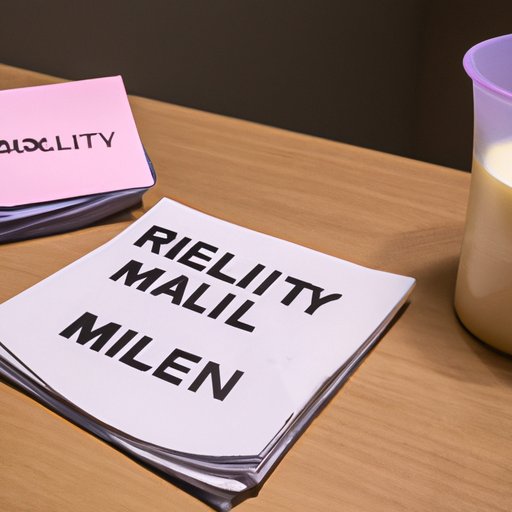Why Buy the Cow When the Milk is Free?
Have you ever heard the saying, “Why buy the cow when the milk is free?” This idiom suggests that there is little incentive to commit to something fully when you can get some of the benefits for free. This phrase is often applied to relationships, where one partner may question the need for commitment when they already have access to the benefits of a relationship without any commitment.
In this article, we’ll explore the origins and relevance of this saying, its financial implications, and the societal pressures that influence our decisions. We’ll also dive into how this saying can perpetuate harmful stereotypes and how we can subvert it for more empowering and equitable alternatives.
A Historical Perspective on the Origins and Relevance of the Adage
The idiom “Why buy the cow when the milk is free?” has been around for a long time. Its origins can be traced back to a time when cows were valuable assets for farmers, as they provided milk, meat, and helped with plowing fields. The saying suggests that it doesn’t make sense to buy a cow when you can get milk from someone else’s cow for free. In modern times, this phrase is often applied to relationships, where one partner may question why they should commit to a relationship when they already have access to some of the benefits.
Despite its age, this saying is still relevant today. Many people have questions about the need for commitment in various aspects of their lives. In the context of a relationship, people may question whether it makes sense to commit fully to someone when they can still enjoy the benefits of romance without any obligations.
Financial Analysis of Costs and Benefits
While this phrase is often used metaphorically, there is some truth to the financial comparison as well. When it comes to cows and milk, there are certainly financial costs and benefits to consider.
On the one hand, buying a cow involves a significant upfront cost. Cows can be expensive, and you also must factor in the cost of feed, housing, and veterinary care. However, there are also long-term financial benefits to owning a cow. You’ll have a steady supply of milk and potentially other income streams from selling milk, cheese, or meat. In some cases, owning a cow may even be more cost-effective in the long run than buying milk from someone else.
When it comes to relationships, the financial comparison is less straightforward. While there may be some financial benefits to committing to a partner, they likely won’t be as substantial or guaranteed as the benefits of owning a cow. However, it’s essential to consider the long-term benefits of investing in a relationship, such as emotional support, companionship, and the potential for a life partner.
Societal Pressures and Gender Roles
While there are financial calculations to be made, the decision to commit is never purely rational. Societal pressures and traditional gender roles often play a significant role in our decisions. Men, in particular, may feel pressure to avoid commitment to avoid being seen as “whipped” or emasculated.
Similarly, women are often expected to prioritize relationships and family over their own ambitions and desires. This can lead to a sense of being undervalued and taken for granted in a relationship, which may contribute to the reluctance to commit fully.
Feminist Commentary on Negative Stereotypes
This saying can be problematic in the way it compares women to cows and suggests that they are commodities to be owned. This reinforces harmful stereotypes about women’s worth being tied to their ability to provide domestic services. It can also promote toxic masculinity by implying that men should avoid commitment to assert their independence.
It’s essential to challenge these stereotypes and promote more equitable and empowering alternatives. One alternative could be to reframe the question as “Why commit to a cow when you can have a cow and a chicken and a goat and a pig?” This reframing acknowledges that relationships involve mutual investment and highlights the value of diversity and variety in life.
Personal Essay on Setting Boundaries and Self-Worth
Setting boundaries and recognizing one’s self-worth is crucial to making empowered choices. Being taken for granted in a relationship can take a significant emotional toll, making it essential to cultivate a strong sense of self-worth. It’s also important to set boundaries and communicate your needs and expectations in a relationship.
For example, if you feel like you’re giving too much and not getting enough in return, it’s essential to communicate this to your partner and set clear boundaries about what you’re willing to tolerate.
Humorous Take on the Saying
Finally, it’s important to recognize the absurdity of comparing a romantic partner to a dairy animal. In some cases, the best way to approach this saying is with a bit of humor. One way to do this could be to subvert the saying entirely. For example, “Why buy the cow when you can get a dog and a cat and some guinea pigs and a parrot?” This approach acknowledges the silliness of the original saying and highlights the value of other forms of companionship.
Conclusion
Overall, the saying “Why buy the cow when the milk is free?” encapsulates a complex issue about the nature of commitment and relationships. While there are financial considerations to be made, these decisions are often influenced by societal pressures and gender roles. It’s essential to recognize these factors and make empowered decisions that align with our values and priorities.
The bottom line is that there is more to a relationship than the financial benefits. Commitment involves mutual investment, emotional support, and ultimately, a sense of shared purpose. By acknowledging the limitations of the “free milk” mentality and building our self-worth, we can create healthy, fulfilling relationships built on strong foundations.
